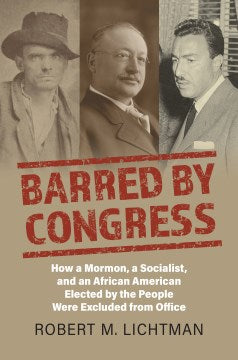
Barred by Congress
Publisher,Univ Pr of Kansas
Publication Date,
Format, Hardcover
Weight, 725.75 g
No. of Pages, 420
On March 2, 1967, the New York Times ran the extra-large headline: HOUSE EXCLUDES POWELL." The sensational story about Congress's exclusion of the long-term African American House member, Adam Clayton Powell, Jr., led to a legal battle over the constitutionality of excluding a representative who had been duly elected by the people and met the constitutional requirements for office. Those who supported the exclusion cited the two most recent examples, namely, the exclusion in 1900 of Brigham H. Roberts,a polygamist Mormon elected in Utah, and the double exclusion in 1919 and 1920 of Victor L. Berger, a socialist newspaper editor elected in Wisconsin. All three of these controversial figures were political outsiders, and all three exclusions involved objectionable motives: religious bias (Roberts), political bias (Berger), and racial bias (Powell). Robert Lichtman has written the definitive work on exclusions and expulsions from Congress. In addition to providing biographies of three remarkable figures in American history, this work illuminates an often ignored or misunderstood aspect of congressional politics, which culminated in the landmark Supreme Court case, Powell v. McCormack. Denying the Most Unbounded Liberty-referring to Alexander Hamilton's claim in the Federalist Papers that the people's ability to choose their representatives is "the most unbounded liberty allowed"-tells the story of these three attempts to deny this liberty, what Hamilton calls "the true principle of a republic.""--

